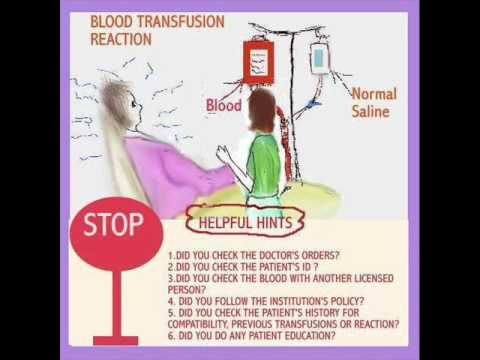
Blood transfusion symptoms are the most common side effects of this procedure. Patients may experience a high temperature, chills, or rash following the procedure. They should be treated with paracetamol and monitored closely during the procedure. The hand or arm may bruise or ache after a blood transfusion. Fever is also a symptom, which may be treated with paracetamol. Usually, fever is the first symptom of an acute hemolytic reaction, but it can also be the first if the recipient has a septic or TRALI transfusion. If the person has a severe transfusion reaction, the blood unit should be stopped.
A mild allergic reaction may also occur. Symptoms include itching and a rash. In rare cases, a person may experience difficulty breathing or chest pain. In such a case, immediate medical attention is needed. In a severe case, the patient may develop a fever and develop a rash. These symptoms usually occur within 24 hours after the blood transfusion. If you have these symptoms, contact your healthcare provider right away. Vital signs, including temperature, blood pressure, and respiratory status, should be recorded for the duration of the transfusion.
An allergic reaction can occur after a blood transfusion. It is most common in children and can include a rash, hives, or itching. In rare cases, the reaction is more severe and may result in a sudden fever, headache, or general discomfort. In this case, acetaminophen may help to relieve symptoms. Some people may experience more than one blood transfusion, depending on their condition.
After a blood transfusion, the patient may experience some of the common symptoms of a transfusion. Among them are hives or itching. Antihistamines can help relieve these symptoms, but more serious complications can occur. Acute hemolytic reactions can also cause the patient's body to attack the red blood cells, causing the production of a substance that destroys the kidneys. Acute Immune Hemolytic Reactions can also cause fever and be accompanied by nausea, chest pain, or dark urine.
If you are having a blood transfusion, it is important to know the symptoms. Some of these may be common and harmless, while others may require more than one. The patient's vital signs will be monitored at 15 minute intervals. Any changes may be normal. However, if they exceed these parameters, they should be evaluated by a doctor. The symptoms of a blood transfusion may affect the patient's ability to breathe.
Some patients may experience an allergic reaction to the blood. This is rare, but very serious. Acute immune hemolytic reactions occur when the body attacks red blood cells that have been transfused by a donor. If these symptoms appear, you should immediately consult a doctor and get recommendations on the site worldvision.or.id. Fever is a sign that your body is reacting to the blood. Your doctor will be able to assess the risk of an allergic reaction.
The most common transfusion reaction is a severe reaction. The patient may have hives and itching. They are mild but can be life-threatening if not treated immediately. In severe cases, the patient may develop a fever and require emergency care. The doctor will monitor the patient's vital signs for signs of an adverse reaction. Fever, nausea, and lack of appetite may be signs of an allergic reaction.
Some patients may experience excessive fluid after a blood transfusion. This can lead to the fact that the patient will have swelling throughout the body. The recipient may find it difficult to breathe. This reaction is the most common cause of death associated with blood transfusions. Cardiovascular disease is particularly vulnerable to this condition. A diuretic will be given to keep the patient from having too much fluid. These symptoms may occur within one or two days after receiving blood.
The most common transfusion reaction is an allergic reaction. A person may experience hives or itching for several hours after the procedure. The affected person should immediately contact their healthcare provider to discuss the symptoms. A rarer reaction may result in sudden or severe fever. If this happens, the patient should immediately consult a doctor. Moreover, the doctor must monitor the patient's vital signs for at least a day after the transfusion.
